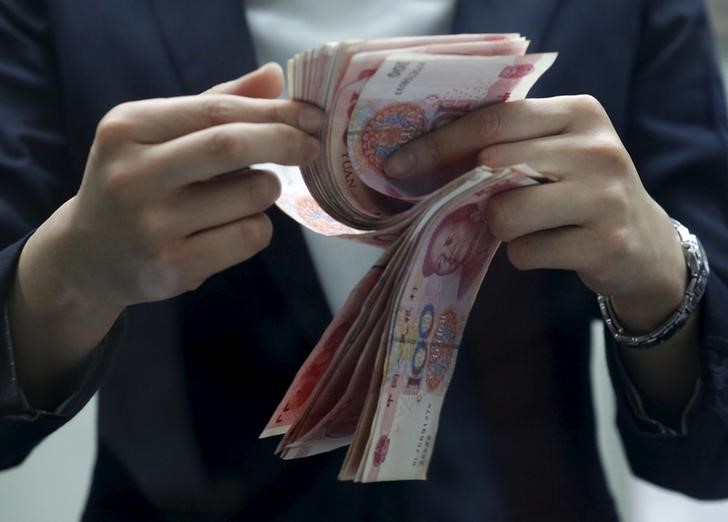By Samuel Shen and Vidya Ranganathan
SHANGHAI/SINGAPORE (Reuters) - China's money markets are bracing for a rough transition into 2017 as a traditional year-end cash deficit coincides with heavy capital outflows and a disruptive bond default that are creating sporadic cash shortages and ramping up counterparty risk.
Reports of brokerage Sealand Securities' <000750.SZ> default on a bond transaction with a bank couldn't have come at a worse time, sowing distrust and wariness in a market that was already stressed. Sealand, which is being investigated by the securities regulator, said on Wednesday it will take responsibility for what it called forged bond agreements.
"The market is short of money. People are rushing to sell everything to get liquidity, from money market funds to corporate bonds to treasuries," said Gu Weiyong, chief investment officer at bond-focused hedge fund manager Ucom Investment Co. "It's a turning point from bull to bear."
The yuan currency
Fueled by easy money, 10-year Chinese bonds (CN10YT=RR) enjoyed a three-year 200-basis point rally, with yields hitting a 14-year low of 2.75 percent in early November. Having already risen to 3.4 percent, Gu expects yields to reach 4 percent next year.
Faced with unrelenting capital outflows, authorities seem determined to keep a tight rein on cash, lending limited amounts for longer periods and at higher cost.
Traders and fund managers expect little respite leading into the Lunar New Year holidays at the end of January, a period in which demand for cash is high.
"I'm worried that the bond market has witnessed just the first wave of sell-offs," said Zhou Li, President at bond-focused asset manager Rationalstone Investment.
Some fund managers even reckon the sell-off could turn as ugly as China's stock market rout between June and August last year that also weighed on other emerging markets.
"We should raise our alert system to the level as high as during the equity market rescue campaign last year, and promptly enact our crisis management plan to fight the currency and financial wars," Wang Hongyuan, co-chairman of First Seafront Fund Management Co said in emailed comments.
COUNTERPARTY RISK
As bond futures collapsed and banks stopped lending to non-banking firms in the wake of the Sealand news last week, financial magazine Caixin reported the People's Bank of China (PBOC) had directed banks to resume lending.
"The market has some unspoken rules, and some people just broke them, leading others think the market is dangerous," a Shanghai-based trader at a Chinese bank said.
In 2014, authorities first allowed solar equipment producer Chaori Solar to default on bond interest payments before later bailing out local investors. This time, however, traders are unsure if authorities will rescue Sealand investors.
That's because policy measures this year have aimed to cut leverage in the banking and corporate sectors, in particular via off-balance-sheet products.
Zhou worries that unless the Sealand episode is handled properly, the default could "trigger panic, and a breakdown of trust between institutions".
Market expectations around the PBOC's cash management are more in harmony, given the persistent capital outflows that have seen foreign exchange reserves fall to $3.05 trillion in November from $3.33 trillion at the end of 2015.
The PBOC has injected a net 1,537.2 billion yuan ($221 billion) into money markets this year through open market operations, many multiples of its net 10 billion yuan injection in 2015.
Traders expect authorities' determination to discourage speculative bets against the currency will only strengthen in early 2017, when an annual limit of $50,000 that individuals can convert into foreign currency is automatically reset.
That is also around the time when Donald Trump, who has pledged to name China a currency manipulator, will assume office as U.S. President.
TIGHT LIQUIDITY
Meanwhile, pressures are stacking up. Banks made mandatory reserve payments around Dec. 15, and also need to tie up funding over the Lunar New Year period. Quarterly government payments under its benefit programs, which have been around 1 trillion yuan in previous years, could meet some of the funding needs but not all.
"The central bank will not allow the market to be flooded with money as it used to be. It still aims to cut leverage at commercial banks," said the Shanghai-based trader.
Traders also suspect cash injections this time will primarily be through medium term loans to banks, rather than cheaper open market operations such as reverse repos.
Sameer Goel, head of Asia macro strategy at Deutsche Bank (DE:DBKGn), says the headwinds from a hawkish U.S. Federal Reserve will add to challenges. Policymakers could "either allow the yuan to continue to weaken or burn reserves or tighten capital restrictions", he said
"Likely that they will opt for a mix of the lot. Importantly, though, none of these options look supportive of the liquidity or rates complex, offshore and increasingly onshore."

($1 = 6.9506 Chinese yuan renminbi)